Following in the Family Footsteps
Devotion to the practice of law runs through multiple generations of
these Wisconsin families.
By Karen Bankston
Science has yet to identify an attorney gene, but a genetic
predisposition for the law seems to run through several Wisconsin
families.
The hereditary link to the law is so strong that some families have
not one, but two or three attorneys in each generation. Some of these
third, fourth, even fifth generation attorneys have lawyer genes on
several branches of their family tree.
For example, the maternal grandfather of attorney siblings Virginia
R. and Daniel Finn was a Philadelphia lawyer, and their paternal
grandmother had three attorney brothers. Their father and mother, J.
Jerome and C. Virginia Finn, are both alumnae of Marquette University
Law School, their father "in the '50s (class of 1958)" and
their mother "in her 50s (class of 1989)," reports Virginia, an
attorney with Michael, Best & Friedrich LLP.
"If our family has any expectation of the law, it is that it will
keep your mind active. Our family values include the Irish love of a
good argument for argument's sake," she adds. "Perhaps we had to be
attorneys for that reason alone."
Thus, the flip side in the nature versus nurture debate wields some
influence. A nearly universal childhood experience among the sons and
daughters of attorneys was spending Saturday mornings at the law office,
though few report that those hours gave them clear insight into the
practice of law.
"I really didn't have any concept of what he did at work," admits
Joseph Tierney IV. "I guess I would have said, 'My father reads
books.'"
These families' professional heritage left vastly different
impressions on younger generations. Rebecca Wickhem Wegner's high school
teachers collected lawyer jokes she could take home to her father. John
O'Melia Jr. remembers attorneys from around the state descending on the
family deer camp each November. Whenever Thomas Drought's family
traveled across the state, they stopped for meals only at restaurants
belonging to the association his father represented. All in all, these
must be good memories because the proud tradition continues in these and
other families across the state.
Legacy of Law: The Smolers
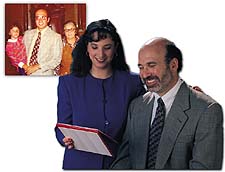
Harriet Stern Smoler, right, the 78th women admitted to
practice in Wisconsin, proudly appears before the Wisconsin Supreme
Court in 1975 to move her son, Bill's, admission to the bar. Bill holds
daughter Tedia, who was admitted to practice 23 years later. Below: Bill
and Tedia recently took a moment to admire Harriet's law school diploma,
which now graces Tedia's office.
Harriet Stern Smoler may not have practiced law for long, but her
love for the profession is reflected in the career choices of her son
and three of her 10 grandchildren.
The newest lawyer in the family, Tedia Smoler, stopped often on her
way to and from the U.W. Law Library to find her grandmother (Class of
'29) and father (Class of '75) in their class pictures. Harriet Smoler's
law school diploma hangs in Tedia's office at the Waukesha County Public
Defender's Office.
After Harriet Stern graduated from law school, she had her own
practice for a short time and worked with the Kenosha Social Services
Department early in the Depression, says her son Bill Smoler. After she
married Fred Smoler, Harriet switched careers to help operate the family
retail business.
Bill believes his mother's passion for the law was manifest in the
tradition of gathering to watch "Meet the Press" and then adjourning for
a Sunday brunch that often stretched over one or two hours as the family
debated political issues of the day. "My mother led those discussions in
a way that was not dissimilar to what I experienced years later in law
school," he recalls.
Harriet appeared before the Wisconsin Supreme Court in 1975 to move
her son's admission to the Bar. "I believe that was one of her proudest
moments," says Bill, an attorney with Murphy & Desmond, Madison.
Harriet died in May 1997, a year before Bill's daughter graduated from
their alma mater. Harriet is one of Wisconsin's first 150 women lawyers
who will be honored by the State Bar at a reception in Madison in
October. (Please see the "President's Perspective" at page 5 for more
information.)
Ask Tedia why she chose a law career, and she may say it comes down
to the difference between her scores on entrance exams for law school
and the psychology graduate school program.
"But my mother says she always knew I'd be a lawyer," Tedia says
ruefully. "She also always said that I like to argue, which I used to
think was a criticism."
Tied to History: The Droughts
The lawyers of the Drought family are linked with the history of
Wisconsin's highways, restaurants, and lumberyards.
James Drought was the executive director, secretary, and attorney for
the Milwaukee Automobile Club and played a major role in the development
of the state's automobile industry. In 1926 he joined his son, Ralph,
just out of the U.W. Law School, to form Drought & Drought. Father
and son practiced together until James retired in 1943. Ralph had a
general practice, and his two principal lobbying clients were the
Wisconsin Restaurant Association and Wisconsin Retail Lumbermen
Association.
"I remember that whenever my family traveled around the state, we
could only eat in restaurants that were part of the restaurant
association, and we were always stopping to visit lumberyards," says
Ralph's son, Thomas.
Unlike his grandfather and father, Thomas never had an opportunity to
practice with his father, who died in 1957 while Thomas was still in law
school. Thomas practices with Cook & Franke, which started out as
Drought & Drought.
He sees many contrasts between the family law practice of his
childhood where photocopies hung from clothespins to dry and typewriters
clacked away in outer offices. "My grandfather and father had a true
general practice," he notes. "Back then there was no such thing as
environmental law, telecommunications law, employment law. People didn't
'specialize' in aircraft litigation or sports law."
Two of Thomas's children represent the fourth generation of Drought
lawyers. Kay Drought is director of the Legal Aid Society in Portsmouth,
N.H. Her sister Ellen was honored this spring as one of two
fourth-generation graduates from the U.W. Law School.
Ellen taught English in Japan, studied journalism, and considered
pursuing a Ph.D. in history before applying for law school. "Although I
enjoyed studying history, I wasn't passionate enough to pursue it," says
Ellen, who will join the securities team at Godfrey & Kahn,
Milwaukee. "A law degree is more versatile. In this day and age, lawyers
do lots of different things."
Triple Tradition: The Affeldts
The Affeldt Law Offices S.C., West Allis, includes three brothers,
David, Steven, and John, whose father, maternal uncle, and grandfathers
on both sides of the family were attorneys. It seems a foregone
conclusion that this third generation would take to the law. On the
other hand, the three partners are the youngest of seven children; their
older siblings chose other career paths.
"I don't think any of us felt as if we were pushed into law," John
says, although the brothers agree that once they decided to become
attorneys, none of them considered any other path than joining the
family firm begun by their grandfather, George A. Affeldt, in 1909.
The Affeldt brothers have a general civil practice in the tradition
of their grandfather and father, George R. Their maternal grandfather,
Louis J. Fellenz, served as district attorney and circuit court judge in
Fond du Lac County and as a state senator. His son, Louis J. Fellenz
Jr., also was a state senator and later worked for the Federal Housing
Authority.
Growing up in a big family was good preparation for practicing law
together, Steven says. "We learned early to get along and share because
we had to."
They remember childhood trips to their father's law office and orders
to be quiet whenever clients stopped by to consult George Affeldt in his
study at home. "We may not have understood totally what dad did as a
lawyer, but we always knew the amount of time, effort, and education
required to do the job well," Steven says.
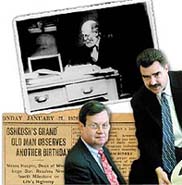
Moses Hooper works at his desk in the Hooper Building (now called the
Algoma Building) at 110 Algoma Blvd. in Oshkosh. At one time, Moses was
the oldest practicing lawyer in the U.S. and the oldest attorney to
argue before the U.S. Supreme Court (at age 93). Edward F. Hooper
(seated at left) represents the family's fourth generation of lawyers.
He practices estate planning in Appleton. Kellett Koch (far right),
representing the fifth generation, recalls that his
great-great-grand-father's career was "a source of great pride in our
family."
Just as law has become a tradition in their family, engaging the
services of the Affeldt Law Offices is an institution for many families
in their hometown. "We have multiple generations of clients to go with
our multiple generations of lawyers," Steven notes. "We still work with
some clients who remember my grandfather coming to their house, and he's
been dead for 45 years."
Following Moses: The Hoopers
Moses Hooper attended Yale University Law School and then came to
Wisconsin in 1857. He settled first in Neenah and later in Oshkosh where
his private practice flourished. Moses was Kimberly-Clark's first
corporate counsel, a post he held until he retired in 1930 after 74
years in the law. At one time, he was the oldest practicing lawyer in
the United States and the oldest attorney to argue before the U.S.
Supreme Court (at age 93). He died in 1932 at age 97.
Moses was joined in his practice by sons Ben and Edward M., who
succeeded his father as Kimberly-Clark's corporate lawyer. William S.
Hooper, Edward's son and Moses' grandson, represents the third
generation of Hooper attorneys. The Hooper family didn't have a lawyer
in the fourth generation until Edward F. Hooper took an early retirement
from his work as a senior systems engineer with IBM to go to law
school.
"I had to fill in for the fourth generation at the last moment. It
finally caught up with me," says the Appleton attorney who concentrates
in estate planning. "In fact, the fifth generation in our family was
admitted to the bar before the fourth."
Kellett Koch, the fifth-generation Hooper family attorney, recalls
that his great-great-grandfather's career was "a source of great pride
in our family." But it was his grandfather, a chemical engineer who
chaired the Kellett Commission to reorganize state government, who
influenced Koch to become an attorney. Koch practices with Koch &
McCann in Milwaukee.
Trial's End: The Wickhems
On the eve of her law school finals, Rebecca Wegner recalls that her
proud father sent her a package filled with memorials full of accolades
for the first three generations of lawyers in her family.
"It terrified me," she confesses with a laugh. "I called him up and
said, 'What are you trying to do to me with all these tributes for what
my family has accomplished?'"
James G. Wickhem, the son of Irish immigrants, began his law practice
in Beloit in 1882, and his son, John D. Wickhem, was a U.W. law
professor who became a Wisconsin Supreme Court justice. The third
generation was represented by John C. Wickhem, a trial lawyer for almost
40 years, who served as president of the State Bar. His wife, Mary, took
a year of law school and served on the Board of Bar Examiners and
several State Bar committees. Mary's father, John Boyle, was U.S.
attorney for Wisconsin's western district, and her brother, John J.
Boyle, was a Janesville attorney who served as a Rock County circuit
judge.
James D. Wickhem practiced with his father as an associate, partner,
and finally as cocounsel until John's death in 1987. "My dad and I were
partners, and he used to kid that his legal education had been repealed
and recreated at least twice in his career," recalls James, a partner
with Meier, Wickhem, Southworth & Lyons, Janesville.
The fifth generation includes James Scot Wickhem, a patent law
specialist with Michael, Best & Friedrich LLP, Milwaukee, and
Rebecca, who recently began her law career at Foley & Lardner in
Milwaukee.
Unlike Rebecca, who decided to pursue law early on (she cowrote a
paper on joint and several liability with her father in high school),
Scot earned a degree in chemistry and was considering his career options
when his advisor suggested patent law as a way to combine two
interests.
Scot recalls that family vacations were planned around the court
schedules of his father and grandfather. His grandfather's succession of
boats the family used at their Canadian island getaway were all
appropriately named "Trial's End."
Is there a sixth generation of attorneys in the wings for the
Wickhems? Of his own children, Scot says wryly, "I'll try to steer them
into medicine, but who knows whether I'll succeed?"
Sharing a Dream: The Pittses
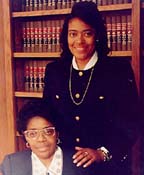
Christina (seated) and Trinette Pitts share more than a name and
close relationship.
This mother/daughter duo realized a shared dream of becoming lawyers,
attending U.W. Law School and even rooming together for two years.
Trinette (U.W. 1982) opened the family's Milwaukee practice in 1984;
Christina (U.W. 1983) joined her full time in 1986.
For Christina Pitts and her daughter, Trinette, becoming a lawyer was
a shared dream realized together.
Christina wanted to pursue a law career when she graduated from high
school at age 16, but her sister was already in college, and her family
could afford tuition for only one at a time. So she went to Milwaukee to
wait her turn and work in her sister's business. She met and married
Clifford Pitts instead.
Trinette traces her own interest in the law to hours she spent after
school watching her mother at work in the Milwaukee County circuit court
as a deputy clerk. "What I didn't know was that she had always aspired
to be a lawyer, too," Trinette says.
They received their undergraduate degrees on the same day in the
spring of 1979, Trinette in a morning ceremony at Marquette University,
and Christina that afternoon from U.W.-Milwaukee. Trinette headed for
U.W. Law School that fall, and her mother followed a year later. For two
years they roomed together and shared the limelight. Christina
acknowledges that Trinette was more comfortable with the attention
surrounding their unique status than she was.
"I remember once being up studying at 3 a.m., wondering, 'What am I
doing? I left a good job for this?'" Christina recalls. "But then I
realized there was no quitting even if I wanted to. I thought, 'If I
flunk out of here, everyone will know.'"
They share a close relationship - Trinette's only concern about their
shared practice is that their offices at opposite ends of the suite are
too far apart - and complementary personalities. Christina remembers an
advisor telling them as they prepared for their moot court competition
in law school, "You'll make a great team. Trinette goes for the jugular,
and you come behind and soothe the ruffled feathers."
Trinette spent a couple years working for another Milwaukee law firm
before she opened the family practice in 1984. Christina, who had
returned to Milwaukee County first as an assistant corporate counsel
processing paternity cases and later as an assistant district attorney,
worked after hours with her daughter and joined Pitts & Pitts, which
bills itself as "the women who care about you," full time in 1986.
Their practice is truly a family business, with son/brother Robert
working as the office manager. Even husband/father Clifford Pitts Sr.,
now a full-time pastor, has caught the law bug, sprinkling his sermons
with legal terms.
"He'll come to us and say, 'Tell me about codicils,'" Trinette says.
"Many people in his congregation know we're lawyers, and they just love
it."
Talking Law: The Tierneys
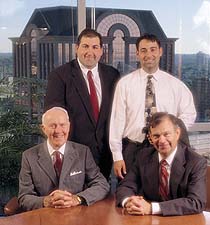
"A lot of people view having the same name and pursuing the same
career as a burden," says Joe Tierney IV (back row, right), "but I've
never felt that way." Having a familiar and respected name helps in
getting to know people, and with four close relatives practicing law
nearby, one never lacks advisors. Gathered in Milwaukee, the Tierneys
are (from left) Joe Jr., Martin, Joe IV, and Joe III.
As Martin Tierney launches his legal career this summer, joining
Ernst & Young in Chicago to practice in tax and employee benefits
law, he'll have a ready pick of advisors to kick around a quick
question. Martin's grandfather, father, and brother, all named Joe,
practice corporate, tax, and real estate law in Milwaukee.
The first Joe Tierney to practice law came from Menominee, Mich., to
study at Marquette University. He graduated in 1913 and went on to
become the first assistant DA in the Milwaukee County District
Attorney's Office. "He also trained a lot of lawyers," says his son
Joseph Tierney Jr., a partner with Cook & Franke, who met many
colleagues over the years who spoke fondly of his father's tutelage.
Joe Jr. joined the FBI straight out of law school in 1941 and worked
with an espionage group in New York during World War II. After the war
he worked in the Waukegan FBI office before he returned to civilian life
as a CPA with Arthur Anderson. By the time he returned to Milwaukee to
practice law, his son, Joseph III, had already launched his own
practice.
Joe III, a partner with Meissner Tierney Fischer & Nichols,
recalls no expectations that he take up the law, but adds, "I can't
imagine doing anything else that would be as interesting. I created my
own expectations, and I tried to do the same for my own sons."
Martin notes that "a lot of my friends in grade school and high
school expected me to become a lawyer, but I never felt any pressure
from the family. In fact, my parents did a wonderful job of getting
behind me when I considered studying quantum mechanics."
Martin's brother, Joe IV, has been redirecting phone calls and email
messages intended for his father and grandfather since he began
practicing in Milwaukee. "It's always a treat picking up the phone and
hearing, 'Joe, I haven't talked to you in 20 years,'" he says. "That
would have made me about six."
But Joe IV, an associate with Domnitz, Mawicke, Goisman &
Rosenberg, wouldn't trade places with a Tom or Sam.
"A lot of people view having the same name and pursuing the same
career as a burden, but I've never felt that way," he contends. "Because
people know my father and grandfather and like them, that opens doors
for me. I don't mean economically, but just in getting to know people. I
feel like I have a sense of history."
Seeking Justice: The Lamelas Family
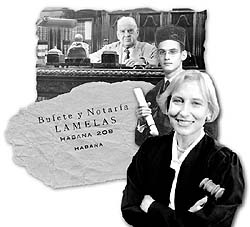
The events witnessed as a child in Cuba and the years the Lamelas
family lived in poverty after first arriving in the United States
influenced the career choices of Elsa de la Caridad Lamelas Salazar, now
known as the Hon. Elsa C. Lamelas of the Milwaukee County circuit court
(below right).
In a picture taken in the family's Havana law firm in the 1950s,
Francisco José Lamelas Collado is seated at a mahogany table carved
by a European craftsman who fled to Cuba during WWII.
"How ironic that a few years later he, too, would have to flee and
leave all behind," says Elsa of her grandfather. "Everything was seized
by the Castro government." A scrap of an old manila envelope with the
law firm name and address is all that remains of the family's firm.
Upon his graduation from the Universidad de la Habana in 1941,
Francisco José Lamelas Blanco (Elsa's father, shown in his
graduation picture) became the youngest member of the Havana Law
Association when he joined his sister and father in the family law
practice.
When Francisco José Lamelas joined his sister and father in the
family law practice in Cuba, he became the youngest member of the Havana
Law Association. He practiced law in his homeland for 20 years, actively
seeking legal reforms, and was busy with a full trial schedule. Then
Fidel Castro came to power, and "things started getting bad little by
little," he recalls. "Being a lawyer became very controversial."
It was time to get the family out of Cuba. Daughters Elsa and Blanche
left first in what were called "Peter Pan" airlifts transporting
children to U.S. orphanages. Next came his wife and young son.
"I was the last one, and I wasn't sure I would be allowed to leave,"
Francisco says. The day before he left, a justice at a Supreme Court
hearing attempted to provoke him into a confrontation that might have
landed him in prison. "I handled that very well, but nobody could be
safe from the government."
After they were reunited, the Lamelases settled in Chicago where
Francisco started law classes, but he discovered he could not finish law
school in the requisite five years while working full time to support
his family. Instead, he found a job as a law clerk and later taught
Spanish language and literature at Dominican College in Racine. His
final career move was to become a juvenile probation officer for 18
years with Milwaukee County.
"I am a lawyer by nature," Francisco acknowledges. He enjoyed
interacting with his juvenile clients and the legal system. And he is
proud that a third generation of the Lamelas family has taken up
law.
Elsa Lamelas crisscrossed the country as an attorney for the Civil
Rights Division of the U.S. Department of Justice before settling down
in Milwaukee, where she worked with the Equal Employment Opportunities
Commission, the district attorney's office, and finally the U.S.
attorney's office before her appointment to the Milwaukee County circuit
court bench.
As Elsa discusses her career choices, she recalls "the dramatic
events I witnessed in Cuba that I will never forget" and the years her
family lived in poverty after first arriving in the United States. "I
really thought the law was an instrument to change the world, and I very
much wanted to do that," she says simply.
Hometown and Beyond: The O'Melias
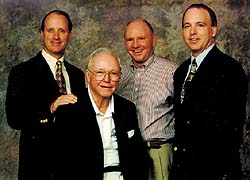
Gathered for a family portrait are O'Melia attorneys (from left) John
Jr., Richard, Michael, and Patrick. Brothers John Jr. and Patrick
practice in the family's Rhinelander firm, their uncle Richard practices
in Washington, D.C., while cousin Michael is a circuit judge in Phoenix,
Ariz.
In Rhinelander in the first half of the century, no one was surprised
when the doctor's child became a doctor or the dentist's son took up
dentistry, recalls Richard O'Melia. The fact that three of Albert J.
(A.J.) O'Melia's sons took up the law was a bit more remarkable.
A.J. O'Melia opened his practice in 1911 after graduating with the
first class out of Marquette University Law School. Two sons, Donald and
John, joined him in the Rhinelander office, while Richard opened the
Milwaukee office of O'Melia and Kaye after completing law school
following service as a Marine fighter pilot in World War II.
Richard went to Washington with family friend Joe McCarthy after
helping with McCarthy's 1952 Senate campaign. "I said I'd go for one
year, and it's been 50," says Richard, who served as general counsel
with the U.S. Senate Operations Committee, which McCarthy chaired. He
later worked on staff with the Civil Aeronautics Board before being
appointed to CAB in 1974. More recently, he became one of the founders
of U.S. African Airways.
Back home, the third generation of O'Melias entered the profession.
In 1979 John Jr. joined his father and uncle in the family firm, now
O'Melia, Schiek and McEldowney. His brother, Patrick, also joined the
practice for several years before becoming Oneida County District
Attorney in 1989.
Their uncle Donald's son, Michael, is a circuit judge in Phoenix, and
his daughter, Amy O'Melia-Endres, recently became a fourth generation
O'Melia lawyer after graduating from Arizona State University Law
School. John Jr. didn't decide to become a lawyer until his second year
in college, though he recalls attending his father's trials while in
high school and once was invited behind the scenes to watch as jury
instructions were drawn up in chambers. Once he decided on the law, "I
always assumed I would come back to Rhinelander and practice with my
father and uncle."
Conclusion
As diverse as these lawyerly families may be, they share an abiding
passion for their work. "This is a wonderful profession that encourages
pro bono work," says Joe Tierney Jr. "It gives us the opportunity to
help people who need help, and we enjoy doing it."
That frame of reference is itself a strong legacy. Notes grandson
Martin, "Because of my father and grandfather, I had a great deal of
respect for the law and still do."
Tedia's mother, Sherry Ackerman, is a Spanish teacher, and Tedia
thinks it fitting that the public defender's office hired her as much
for her knowledge of Spanish as for her law degree. "I get to use my
mother's skill in my father's profession," she says.
Karen Bankston is a first
generation writer/editor based in Stoughton.
Wisconsin
Lawyer
